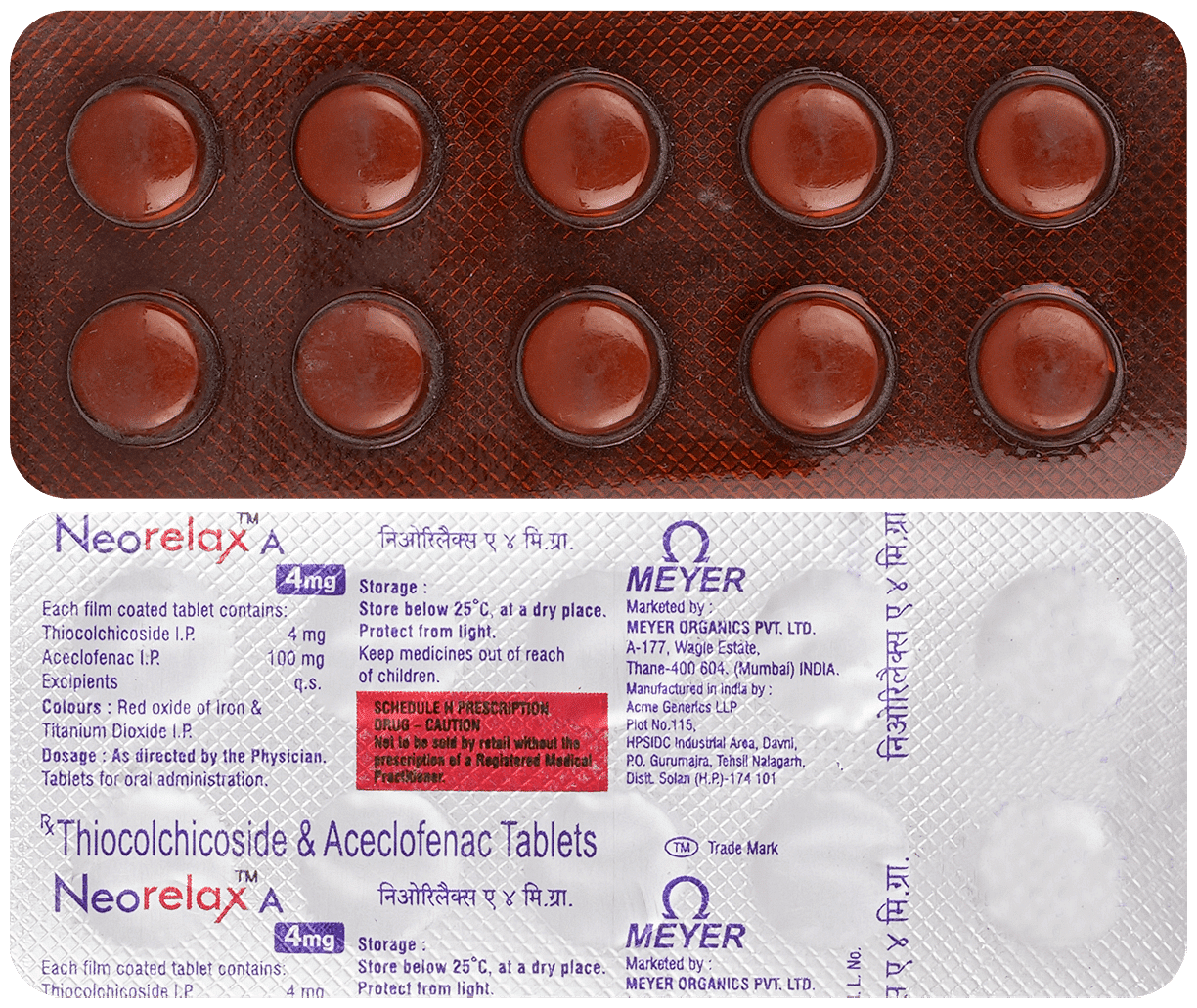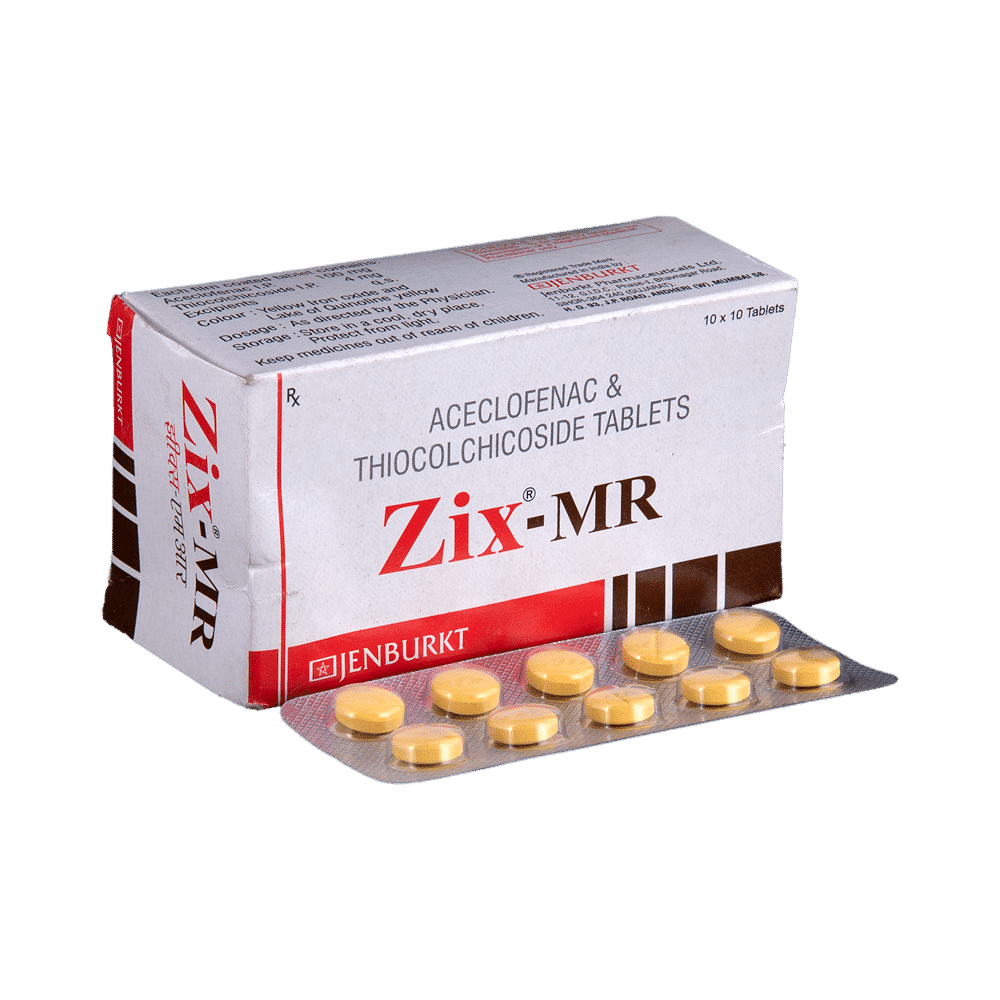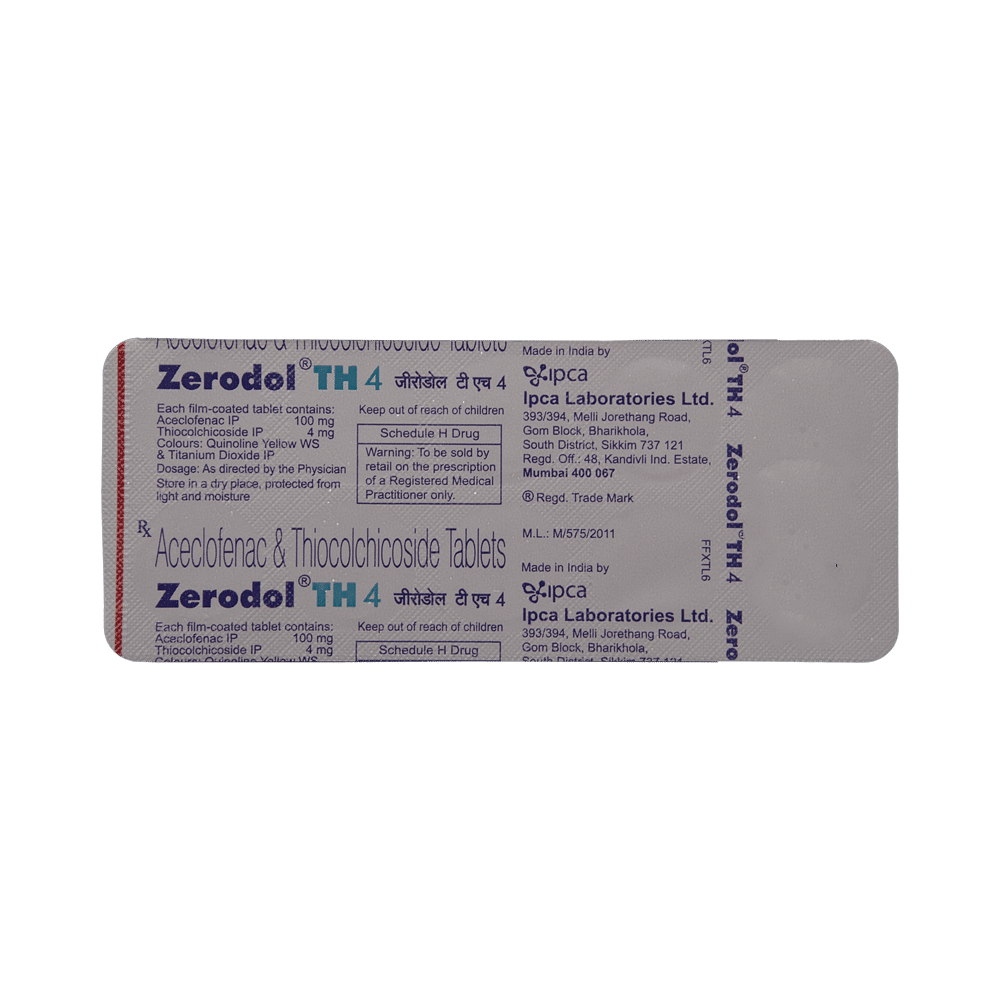
Thio A 100mg/4mg Tablet
Manufacturer
One Pharma Drugs & Pharmaceuticals Private Limited
Salt Composition
Aceclofenac (100mg) + Thiocolchicoside (4mg)
Key Information
Short Description
Thio A 100mg/4mg Tablet is a combination medicine used in the treatment of pain due to muscle spasms. It improves the movement of muscles and provides relief from pain and discomfort associated with muscle spasms.
Dosage Form
Tablet
Introduction
Thio A 100mg/4mg Tablet should be taken with food. This will prevent you from getting an upset stomach. You should take it regularly as advised by your doctor. Do not take more or use it for a longer duration than recommended by your doctor. Some of the common side effects of this medicine include nausea, vomiting, heartburn, stomach pain, loss of appetite, and diarrhea. If any of these side effects bother you or do not go away with time, you should let your doctor know. Your doctor may help with ways to reduce or prevent these side effects. The medicine may not be suitable for everybody. Before taking it, let your doctor know if you have any problems with your heart, kidneys, and liver. To make sure it is safe for you, let your doctor also know all the other medicines you are taking. Pregnant and breastfeeding mothers should first consult their doctors before using the medicine.
Directions for Use
Take this medicine in the dose and duration as advised by your doctor. Swallow it as a whole. Do not chew, crush or break it. Thio A 100mg/4mg Tablet is to be taken with food.
How it works
Thio A 100mg/4mg Tablet is a combination of two medicines: Aceclofenac and Thiocolchicoside which relieves pain and relaxes the muscles.
Quick Tips
Thio A 100mg/4mg Tablet helps relieve pain and muscle spasm that may occur due to strains, sprains, and muscle injuries. It is usually used along with rest and physical therapy. Take it with food to avoid an upset stomach. It may cause dizziness. Do not drive or do anything requiring concentration until you know how it affects you. Avoid consuming alcohol when taking Thio A 100mg/4mg Tablet as it may cause excessive drowsiness.
Related Medicines

Neorelax A 4mg Tablet

Zix-MR Tablet

Zerodol TH 4 Tablet

Acecon T 100mg/4mg Tablet

Thiozac A 100mg/4mg Tablet

Acticross TH 100mg/4mg Tablet

Zimfe-TH 100mg/4mg Tablet

Consace TH 100mg/4mg Tablet

Myomusc A 100mg/4mg Tablet

Brace TH 100mg/4mg Tablet
Frequently asked questions
What is Thio A 100mg/4mg Tablet?
Thio A 100mg/4mg Tablet is a combination of two medicines: Aceclofenac and Thiocolchicoside. This medication helps in relieving muscle pain by relaxing muscles through action on the central nervous system and reducing chemicals within the body that cause pain and inflammation.
Is Thio A 100mg/4mg Tablet safe to use?
Thio A 100mg/4mg Tablet is generally considered safe for most patients. However, it may cause some common side effects in a few individuals, such as nausea, vomiting, stomach pain, heartburn, diarrhea, and others. If you experience any persistent problems due to this medication, inform your doctor.
Can I stop using Thio A 100mg/4mg Tablet once my pain is relieved?
Thio A 100mg/4mg Tablet is often used for short-term relief and can be discontinued when pain subsides. However, if your doctor recommends continuing the medication, do so as instructed.
Can Thio A 100mg/4mg Tablet cause dizziness?
Yes, using Thio A 100mg/4mg Tablet may lead to dizziness (feeling faint, weak, unsteady, or lightheaded) in some individuals. If you experience dizziness or lightheadedness, it's advisable to rest and resume your activities once feeling better.
Are there any contraindications with Thio A 100mg/4mg Tablet?
It is essential to avoid Thio A 100mg/4mg Tablet in individuals with known allergies to painkillers or components of this medication. The use of this medication should be avoided in patients with a history of stomach ulcers, active, recurrent stomach ulcer, or bleeding. It also needs to be avoided in those with a history of heart failure, high blood pressure, and liver or kidney disease.
Can Thio A 100mg/4mg Tablet be taken with Vitamin B-complex?
Yes, Thio A 100mg/4mg Tablet can be taken alongside Vitamin B-complex preparations. While Thio A 100mg/4mg Tablet relieves pain, Vitamin B-complex supplements help correct vitamin deficiency that may be causing your symptoms.
Can Thio A 100mg/4mg Tablet damage the kidneys?
Long-term use of Thio A 100mg/4mg Tablet may cause kidney damage. Normal kidneys produce a chemical called prostaglandins to protect them from harm. Painkillers reduce prostaglandin levels in the body, leading to potential kidney damage over extended use. Avoid taking painkillers if you have pre-existing kidney disease.
Will higher doses of Thio A 100mg/4mg Tablet be more effective?
No, increasing the dosage of this medication will not make it more effective; instead, it may lead to increased side effects. If your symptoms are worsening, consult your doctor for a re-evaluation.


